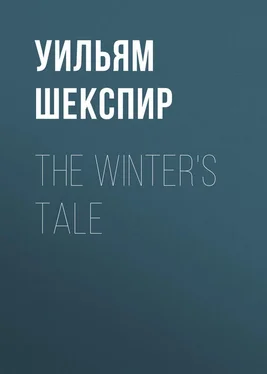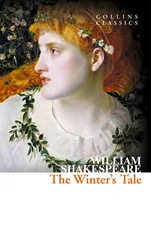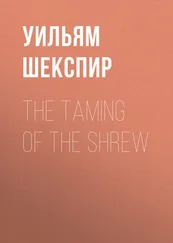Уильям Шекспир - The Winter's Tale
Здесь есть возможность читать онлайн «Уильям Шекспир - The Winter's Tale» — ознакомительный отрывок электронной книги совершенно бесплатно, а после прочтения отрывка купить полную версию. В некоторых случаях можно слушать аудио, скачать через торрент в формате fb2 и присутствует краткое содержание. Издательство: Иностранный паблик, Жанр: Европейская старинная литература, Драматургия, foreign_dramaturgy, на английском языке. Описание произведения, (предисловие) а так же отзывы посетителей доступны на портале библиотеки ЛибКат.
- Название:The Winter's Tale
- Автор:
- Издательство:Иностранный паблик
- Жанр:
- Год:неизвестен
- ISBN:нет данных
- Рейтинг книги:4 / 5. Голосов: 1
-
Избранное:Добавить в избранное
- Отзывы:
-
Ваша оценка:
- 80
- 1
- 2
- 3
- 4
- 5
The Winter's Tale: краткое содержание, описание и аннотация
Предлагаем к чтению аннотацию, описание, краткое содержание или предисловие (зависит от того, что написал сам автор книги «The Winter's Tale»). Если вы не нашли необходимую информацию о книге — напишите в комментариях, мы постараемся отыскать её.
The Winter's Tale — читать онлайн ознакомительный отрывок
Ниже представлен текст книги, разбитый по страницам. Система сохранения места последней прочитанной страницы, позволяет с удобством читать онлайн бесплатно книгу «The Winter's Tale», без необходимости каждый раз заново искать на чём Вы остановились. Поставьте закладку, и сможете в любой момент перейти на страницу, на которой закончили чтение.
Интервал:
Закладка:
Enter POLIXENES
POLIXENES. This is strange. Methinks
My favour here begins to warp. Not speak?
Good day, Camillo.
CAMILLO. Hail, most royal sir!
POLIXENES. What is the news i' th' court?
CAMILLO. None rare, my lord.
POLIXENES. The King hath on him such a countenance
As he had lost some province, and a region
Lov'd as he loves himself; even now I met him
With customary compliment, when he,
Wafting his eyes to th' contrary and falling
A lip of much contempt, speeds from me;
So leaves me to consider what is breeding
That changes thus his manners.
CAMILLO. I dare not know, my lord.
POLIXENES. How, dare not! Do not. Do you know, and dare not
Be intelligent to me? 'Tis thereabouts;
For, to yourself, what you do know, you must,
And cannot say you dare not. Good Camillo,
Your chang'd complexions are to me a mirror
Which shows me mine chang'd too; for I must be
A party in this alteration, finding
Myself thus alter'd with't.
CAMILLO. There is a sickness
Which puts some of us in distemper; but
I cannot name the disease; and it is caught
Of you that yet are well.
POLIXENES. How! caught of me?
Make me not sighted like the basilisk;
I have look'd on thousands who have sped the better
By my regard, but kill'd none so. Camillo-
As you are certainly a gentleman; thereto
Clerk-like experienc'd, which no less adorns
Our gentry than our parents' noble names,
In whose success we are gentle- I beseech you,
If you know aught which does behove my knowledge
Thereof to be inform'd, imprison't not
In ignorant concealment.
CAMILLO. I may not answer.
POLIXENES. A sickness caught of me, and yet I well?
I must be answer'd. Dost thou hear, Camillo?
I conjure thee, by all the parts of man
Which honour does acknowledge, whereof the least
Is not this suit of mine, that thou declare
What incidency thou dost guess of harm
Is creeping toward me; how far off, how near;
Which way to be prevented, if to be;
If not, how best to bear it.
CAMILLO. Sir, I will tell you;
Since I am charg'd in honour, and by him
That I think honourable. Therefore mark my counsel,
Which must be ev'n as swiftly followed as
I mean to utter it, or both yourself and me
Cry lost, and so goodnight.
POLIXENES. On, good Camillo.
CAMILLO. I am appointed him to murder you.
POLIXENES. By whom, Camillo?
CAMILLO. By the King.
POLIXENES. For what?
CAMILLO. He thinks, nay, with all confidence he swears,
As he had seen 't or been an instrument
To vice you to't, that you have touch'd his queen
Forbiddenly.
POLIXENES. O, then my best blood turn
To an infected jelly, and my name
Be yok'd with his that did betray the Best!
Turn then my freshest reputation to
A savour that may strike the dullest nostril
Where I arrive, and my approach be shunn'd,
Nay, hated too, worse than the great'st infection
That e'er was heard or read!
CAMILLO. Swear his thought over
By each particular star in heaven and
By all their influences, you may as well
Forbid the sea for to obey the moon
As or by oath remove or counsel shake
The fabric of his folly, whose foundation
Is pil'd upon his faith and will continue
The standing of his body.
POLIXENES. How should this grow?
CAMILLO. I know not; but I am sure 'tis safer to
Avoid what's grown than question how 'tis born.
If therefore you dare trust my honesty,
That lies enclosed in this trunk which you
Shall bear along impawn'd, away to-night.
Your followers I will whisper to the business;
And will, by twos and threes, at several posterns,
Clear them o' th' city. For myself, I'll put
My fortunes to your service, which are here
By this discovery lost. Be not uncertain,
For, by the honour of my parents, I
Have utt'red truth; which if you seek to prove,
I dare not stand by; nor shall you be safer
Than one condemn'd by the King's own mouth, thereon
His execution sworn.
POLIXENES. I do believe thee:
I saw his heart in's face. Give me thy hand;
Be pilot to me, and thy places shall
Still neighbour mine. My ships are ready, and
My people did expect my hence departure
Two days ago. This jealousy
Is for a precious creature; as she's rare,
Must it be great; and, as his person's mighty,
Must it be violent; and as he does conceive
He is dishonour'd by a man which ever
Profess'd to him, why, his revenges must
In that be made more bitter. Fear o'ershades me.
Good expedition be my friend, and comfort
The gracious Queen, part of this theme, but nothing
Of his ill-ta'en suspicion! Come, Camillo;
I will respect thee as a father, if
Thou bear'st my life off hence. Let us avoid.
CAMILLO. It is in mine authority to command
The keys of all the posterns. Please your Highness
To take the urgent hour. Come, sir, away. Exeunt
ACT II. SCENE I. Sicilia. The palace of LEONTES
Enter HERMIONE, MAMILLIUS, and LADIES
HERMIONE. Take the boy to you; he so troubles me,
'Tis past enduring.
FIRST LADY. Come, my gracious lord,
Shall I be your playfellow?
MAMILLIUS. No, I'll none of you.
FIRST LADY. Why, my sweet lord?
MAMILLIUS. You'll kiss me hard, and speak to me as if
I were a baby still. I love you better.
SECOND LADY. And why so, my lord?
MAMILLIUS. Not for because
Your brows are blacker; yet black brows, they say,
Become some women best; so that there be not
Too much hair there, but in a semicircle
Or a half-moon made with a pen.
SECOND LADY. Who taught't this?
MAMILLIUS. I learn'd it out of women's faces. Pray now,
What colour are your eyebrows?
FIRST LADY. Blue, my lord.
MAMILLIUS. Nay, that's a mock. I have seen a lady's nose
That has been blue, but not her eyebrows.
FIRST LADY. Hark ye:
The Queen your mother rounds apace. We shall
Present our services to a fine new prince
One of these days; and then you'd wanton with us,
If we would have you.
SECOND LADY. She is spread of late
Into a goodly bulk. Good time encounter her!
HERMIONE. What wisdom stirs amongst you? Come, sir, now
I am for you again. Pray you sit by us,
And tell's a tale.
MAMILLIUS. Merry or sad shall't be?
HERMIONE. As merry as you will.
MAMILLIUS. A sad tale's best for winter. I have one
Of sprites and goblins.
HERMIONE. Let's have that, good sir.
Come on, sit down; come on, and do your best
To fright me with your sprites; you're pow'rfull at it.
MAMILLIUS. There was a man-
HERMIONE. Nay, come, sit down; then on.
MAMILLIUS. Dwelt by a churchyard- I will tell it softly;
Yond crickets shall not hear it.
HERMIONE. Come on then,
And give't me in mine ear.
Enter LEONTES, ANTIGONUS, LORDS, and OTHERS
LEONTES. he met there? his train? Camillo with him?
FIRST LORD. Behind the tuft of pines I met them; never
Saw I men scour so on their way. I ey'd them
Even to their ships.
LEONTES. How blest am I
In my just censure, in my true opinion!
Alack, for lesser knowledge! How accurs'd
In being so blest! There may be in the cup
A spider steep'd, and one may drink, depart,
And yet partake no venom, for his knowledge
Is not infected; but if one present
Th' abhorr'd ingredient to his eye, make known
How he hath drunk, he cracks his gorge, his sides,
With violent hefts. I have drunk, and seen the spider.
Camillo was his help in this, his pander.
There is a plot against my life, my crown;
All's true that is mistrusted. That false villain
Whom I employ'd was pre-employ'd by him;
He has discover'd my design, and I
Remain a pinch'd thing; yea, a very trick
For them to play at will. How came the posterns
So easily open?
FIRST LORD. By his great authority;
Which often hath no less prevail'd than so
On your command.
LEONTES. I know't too well.
Give me the boy. I am glad you did not nurse him;
Though he does bear some signs of me, yet you
Have too much blood in him.
HERMIONE. What is this? Sport?
LEONTES. Bear the boy hence; he shall not come about her;
Away with him; and let her sport herself
[MAMILLIUS is led out]
With that she's big with- for 'tis Polixenes
Has made thee swell thus.
HERMIONE. But I'd say he had not,
And I'll be sworn you would believe my saying,
Howe'er you lean to th' nayward.
LEONTES. You, my lords,
Look on her, mark her well; be but about
To say 'She is a goodly lady' and
The justice of your hearts will thereto ad
'Tis pity she's not honest- honourable.'
Praise her but for this her without-door form,
Which on my faith deserves high speech, and straight
The shrug, the hum or ha, these petty brands
That calumny doth use- O, I am out! -
That mercy does, for calumny will sear
Virtue itself- these shrugs, these hum's and ha's,
When you have said she's goodly, come between,
Ere you can say she's honest. But be't known,
From him that has most cause to grieve it should be,
She's an adultress.
HERMIONE. Should a villain say so,
The most replenish'd villain in the world,
He were as much more villain: you, my lord,
Do but mistake.
LEONTES. You have mistook, my lady,
Polixenes for Leontes. O thou thing!
Which I'll not call a creature of thy place,
Lest barbarism, making me the precedent,
Should a like language use to all degrees
And mannerly distinguishment leave out
Betwixt the prince and beggar. I have said
She's an adultress; I have said with whom.
More, she's a traitor; and Camillo is
A federary with her, and one that knows
What she should shame to know herself
But with her most vile principal- that she's
A bed-swerver, even as bad as those
That vulgars give bold'st titles; ay, and privy
To this their late escape.
HERMIONE. No, by my life,
Privy to none of this. How will this grieve you,
When you shall come to clearer knowledge, that
You thus have publish'd me! Gentle my lord,
You scarce can right me throughly then to say
You did mistake.
LEONTES. No; if I mistake
In those foundations which I build upon,
The centre is not big enough to bear
A school-boy's top. Away with her to prison.
He who shall speak for her is afar off guilty
But that he speaks.
HERMIONE. There's some ill planet reigns.
I must be patient till the heavens look
With an aspect more favourable. Good my lords,
I am not prone to weeping, as our sex
Commonly are- the want of which vain dew
Perchance shall dry your pities- but I have
That honourable grief lodg'd here which burns
Worse than tears drown. Beseech you all, my lords,
With thoughts so qualified as your charities
Shall best instruct you, measure me; and so
The King's will be perform'd!
LEONTES. [To the GUARD] Shall I be heard?
HERMIONE. Who is't that goes with me? Beseech your highness
My women may be with me, for you see
My plight requires it. Do not weep, good fools;
There is no cause; when you shall know your mistress
Has deserv'd prison, then abound in tears
As I come out: this action I now go on
Is for my better grace. Adieu, my lord.
I never wish'd to see you sorry; now
I trust I shall. My women, come; you have leave.
LEONTES. Go, do our bidding; hence!
Exeunt HERMIONE, guarded, and LADIES
FIRST LORD. Beseech your Highness, call the Queen again.
ANTIGONUS. Be certain what you do, sir, lest your justice
Prove violence, in the which three great ones suffer,
Yourself, your queen, your son.
FIRST LORD. For her, my lord,
I dare my life lay down- and will do't, sir,
Please you t' accept it- that the Queen is spotless
I' th' eyes of heaven and to you- I mean
In this which you accuse her.
ANTIGONUS. If it prove
She's otherwise, I'll keep my stables where
I lodge my wife; I'll go in couples with her;
Than when I feel and see her no farther trust her;
For every inch of woman in the world,
Ay, every dram of woman's flesh is false,
If she be.
LEONTES. Hold your peaces.
FIRST LORD. Good my lord-
ANTIGONUS. It is for you we speak, not for ourselves.
You are abus'd, and by some putter-on
That will be damn'd for't. Would I knew the villain!
I would land-damn him. Be she honour-flaw'd-
I have three daughters: the eldest is eleven;
The second and the third, nine and some five;
If this prove true, they'll pay for 't. By mine honour,
I'll geld 'em all; fourteen they shall not see
To bring false generations. They are co-heirs;
And I had rather glib myself than they
Should not produce fair issue.
LEONTES. Cease; no more.
You smell this business with a sense as cold
As is a dead man's nose; but I do see't and feel't
As you feel doing thus; and see withal
The instruments that feel.
ANTIGONUS. If it be so,
We need no grave to bury honesty;
There's not a grain of it the face to sweeten
Of the whole dungy earth.
LEONTES. What! Lack I credit?
FIRST LORD. I had rather you did lack than I, my lord,
Upon this ground; and more it would content me
To have her honour true than your suspicion,
Be blam'd for't how you might.
LEONTES. Why, what need we
Commune with you of this, but rather follow
Our forceful instigation? Our prerogative
Calls not your counsels; but our natural goodness
Imparts this; which, if you- or stupified
Or seeming so in skill- cannot or will not
Relish a truth like us, inform yourselves
We need no more of your advice. The matter,
The loss, the gain, the ord'ring on't, is all
Properly ours.
ANTIGONUS. And I wish, my liege,
You had only in your silent judgment tried it,
Without more overture.
LEONTES. How could that be?
Either thou art most ignorant by age,
Or thou wert born a fool. Camillo's flight,
Added to their familiarity-
Which was as gross as ever touch'd conjecture,
That lack'd sight only, nought for approbation
But only seeing, all other circumstances
Made up to th' deed- doth push on this proceeding.
Yet, for a greater confirmation-
For, in an act of this importance, 'twere
Most piteous to be wild- I have dispatch'd in post
To sacred Delphos, to Apollo's temple,
Cleomenes and Dion, whom you know
Of stuff'd sufficiency. Now, from the oracle
They will bring all, whose spiritual counsel had,
Shall stop or spur me. Have I done well?
FIRST LORD. Well done, my lord.
LEONTES. Though I am satisfied, and need no more
Than what I know, yet shall the oracle
Give rest to th' minds of others such as he
Whose ignorant credulity will not
Come up to th' truth. So have we thought it good
From our free person she should be confin'd,
Lest that the treachery of the two fled hence
Be left her to perform. Come, follow us;
We are to speak in public; for this business
Will raise us all.
ANTIGONUS. [Aside] To laughter, as I take it,
If the good truth were known.
Интервал:
Закладка:
Похожие книги на «The Winter's Tale»
Представляем Вашему вниманию похожие книги на «The Winter's Tale» списком для выбора. Мы отобрали схожую по названию и смыслу литературу в надежде предоставить читателям больше вариантов отыскать новые, интересные, ещё непрочитанные произведения.
Обсуждение, отзывы о книге «The Winter's Tale» и просто собственные мнения читателей. Оставьте ваши комментарии, напишите, что Вы думаете о произведении, его смысле или главных героях. Укажите что конкретно понравилось, а что нет, и почему Вы так считаете.












